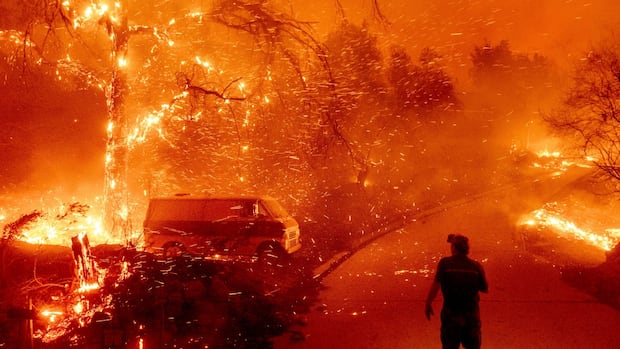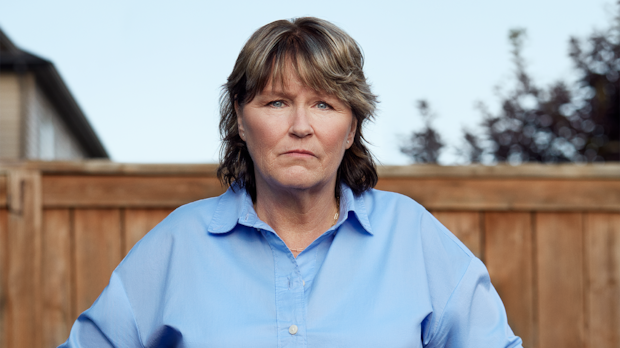The deadly wildfires that swept through Los Angeles this year likely contributed to hundreds more deaths, say researchers calling for better health tracking in the wake of natural disasters.
As Canadian communities from B.C. to Newfoundland battle flames and drifting smoke, new research from JAMA medical journal published Wednesday draws attention to the long-term health effects associated with recent wildfires in L.A. and Maui, Hawai’i.
A total of 30 people died directly from the L.A. wildfires, according to the study.
Andrew Stokes of Boston University School of Public Health and Finnish researchers now estimate another 440 people died from health conditions related to the blaze.
Stokes said these could be people with heart or lung conditions exacerbated by smoke. Mental health impacts and delays in care may have also contributed.
In total, 6,371 deaths were observed compared with 5,931 expected from previous data, for a total of 440 “excess deaths.” The researchers acknowledged the data was provisional and unmeasured factors could’ve played a role.
As evacuees in Los Angeles start to consider returning home, research suggests the toxic aftereffects of urban wildfires can linger for months in structures that survive the flames.
“Each of these statistics is an underlying person with family that’s now bereaved as a result,” Stokes said.
Getting a sense of the true burden of health impacts related to wildfires, including cancers among wildland firefighters that develop years later, may help prioritize disaster resources, he said.
Need for proactive approach
More than 100 people died directly from the Maui wildfire in August 2023, which also left one in five people tracked in the study with lung damage up to 14 months later.
Dr. Sonia Angell, a professor in the epidemiology department at Johns Hopkins Bloomberg School of Public Health, called for better tracking.
“If we are lulled into the idea that the impact that climate has on health is really during the episodes then we’re really getting behind the eight ball,” Angell said.”We’re really missing out on opportunities to improve health and to prevent illness and death.”
Angell said most people see extreme weather events like wildfires, hurricanes or earthquakes as extreme shocks in the moment. But he health risks don’t end there.
“Our surveillance systems need to be improved to be able to really understand the impact of climate and health, so that our health departments and our governments can be more proactive rather than reactive,” Angell said.
Angell gave the example of compromised lung function after a wildfire that needs medical attention, but may never have been included in the formal counts.
Dr. Courtney Howard, an emergency physician based in Yellowknife who treats patients harmed by wildfire smoke, said a new approach to showing the longer health impacts of wildfire from wildfires is important.
“Too many Canadians have now had the experience of living within a smoky environment,” Howard said from near Osoyoos, B.C.
Smoke exposure can cause headache, runny nose, throat irritation and cough, she said. Provincial health officials say severe cough, shortness of breath, heart palpitations and wheezing are less common symptoms.
“I don’t want to scare people, but what is absolutely clear is that wildfire smoke is toxic,” Howard said. “It’s very bad for our lungs and we need to be decreasing our exposure as much as possible.”
Vulnerable at risk
Health Canada estimated up to 240 annual deaths and $1.8 billion in healthcare costs are due to short-term health effects from wildfires.
This week, health officials from B.C. to Newfoundland have warned vulnerable residents, such as those over age 65, pregnant, young children, people who have underlying medical conditions and those who physically exert themselves outside for work or sports, that they’re considered at high risk of suffering health effects from smoke.
Residents in smoky areas are advised to reduce their exposure:
- Keep windows and doors closed.
- Limit outdoor and strenuous activity.
- Turn off or use recirculation settings on HVAC systems to prevent smoke from entering.
- Use portable HEPA cleaners to filter air in one area of the home.
- Check in and care for those who are vulnerable.
Howard said years of more intense wildfires in Canada reflect the impacts of climate change from fossil fuel combustion and other types of greenhouse gas emissions.
“We still, I believe, have the ability to emergently decrease those greenhouse gas emissions and get ourselves onto a different track.”







